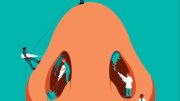Orders roll in from unseen commanders and throngs of troops shuffle to work. They tear apart tubes, unclamp hoses, snap sinewy support lines, pull power cordsthey undo the details of their flexible infrastructure. In record time they've packed up and shipped out. Observers might call it an orderly retreat. But these aren't soldiers ditching a mission. They're cells, explains Maria Rupnick, M.D., Ph.D. '91, the cells of an extremely overweight mouseand they've just disassembled the intricate network of blood vessels that feed big packs of body fat. Soon the mouse has healthily shed half its weight, safely reduced its appetite, possibly extended its life span, and left researchers puzzling over how it all happenedand what it could mean.
In most animals, weight losses this dramatic are usually bad news: either the animal is sick or it's starving. But Rupnick, an instructor of cardiovascular medicine at Harvard Medical School and Brigham and Women's Hospital, has found that unique drugs called angiogenesis inhibitors, originally designed to prevent new blood-vessel growth in cancerous tumors, can actually shrink adipose tissuefat. Although the mechanisms guiding this weight-loss wonder remain unclear, Rupnick and her colleagues are formulating complex questions about how human tissues grow. They're also making fresh moves across the chessboard of medical research, where breakthroughs are measured by their strategic potential to treat illness.
Rupnick's true focus isn't fatshe's primarily interested in blood-vessel growth, or angiogenesis. But there are few opportunities for such study, she explains, because humans generally stop growing at adulthood. For years, new growth in adults was linked primarily to pregnancy, wound regeneration, and cancerous tumors. But in the late 1990s, a laboratory epiphany launched Rupnick past this research roadblock: "I realized that, because you can put on pounds and pounds of adipose tissue, blood vessels very likely have to be growing in it, even though the conventional thinking was that blood vessels don't grow in an adult. No one ever looked at fat."
Getting the fat meant working with "handfuls of fur"specially bred mice three to four times the size of their "normal" cousins. These obese mice lack leptin, a protein thatin mice and humanssignals appetite satiation, or "fullness," so they spend most of their day mobbing a food bowl. Rupnick administered a course of angiogenesis inhibitors to her rodents and discovered that certain drugs not only stopped new blood-vessel growth in fat, they also initiated fat reduction and a tag-along drop in appetite. All this, says Rupnick, comes topped with a sweet detail: the process seems free of side effects. She posits that the mice burn fat for fuel as fat-bound blood vessels shut down and retreat. This is part of the reason, she thinks, that normal mice included in the study did not lose weight nearly as dramaticallythey just don't have as much fat to burn.
It's good news for obese mice: thinner means healthier. Rupnick doesn't know exactly what causes this fat-busting combo, but she's learned that blood-vessel growth may vary according to contextdepending on whether it's patching a wound, feeding a fetus, or maintaining an adipose clump. This leads to an exciting theory: what if blood vessels in fat are different from those in other parts of the body? Perhaps, like a military "tent city," such vessels are immature or impermanentready to set up or break down in a flash. If Rupnick's theory proves correct, she cautiously anticipates future medical moves that could use angiogenesis drugs to manage blood-vessel growth in other tissues. If that leap is possible, she explains, doctors may one day treat ailments tactically via the beautiful lattice of the body's vascular system, generating fresh growth around old damaged arteries or dismantling a tumor's supply lines.
The inhibitors and theories that Rupnick employs arrived from the pioneering work of Andrus professor of pediatric surgery and cell biology Judah Folkman, with whom Rupnick has worked for several years. Folkman and his colleagues shoved cancer research onto a new course in the early 1970s with the theory that cancerous tumors were dependent on their blood supplies and could thus be controlled by stopping angiogenesis. That work later spawned inhibitors like TNP-470 and endostatinboth key drugs in Rupnick's experimentsthat have been used in clinical human cancer trials. Folkman, a fan of Rupnick's research, derails speculation that would set her work on a supermarket shelf alongside six-packs of Slim-Fast. "Everybody mistakes that we're trying to find a treatment for obesity," he says. "It's not likely to have much effect on fat unless someone was extremely, extremely overweight."
Still, Rupnick, who last year won a Samuel A. Levine Young Investigators Award from the American Heart Association for her work, says she can't ignore the implications for obesity studies. But at a time when obesity is a looming international health problem and consumers shiver in anticipation of miracle diets, Rupnick is painstakingly clear. "We're at the stage of a mouse. That's a long way from a man."
~Neil Shea
Maria Rupnick e-mail address:
rupnick@hub.tch.harvard.edu





